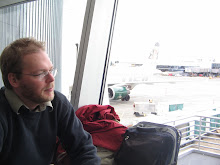Well, I just finished with a "Reference retreat" here at UW-Madison. It sounds fancier than it is, there is no secluded resort full of white-gloved servants; it's more like a day of presentations and meeting people, which is fine. Unfortunately, much of the stuff didn't have a lot of bearing on what I will be doing any time soon, but it is always good to bear witness to a passionate debate about the future of reference services. It may not be the most exciting thing to a lot of people, but others find the whole thing fascinating. Since there is a lot of discussion about the future of reference services and how technology will play out with it, I thought that there might be some brains I could tap into about wiki development. Alas, though web 2.0 may be a catchword that excites many librarians, most of them are largely mystified by it. My "lunch group" had as their topic wiki technologies, but the participants mostly were using them as consolidated human resource tools and technical quick references for documents previously stored on paper. When I asked if anyone was thinking about turning their HTML subject guides for their libraries into collaborative wikis all I got was blank stares. Oh well. It just goes to reinforce how new this technology is to many. One thing that got repeated over and over though, is that the real challenge behind a wiki is to get people to use it, then contribute to it.
My biggest new contribution is an entry for Education, though a few areas under education could still use some filling out, especially with the non-formal distance education I mentioned earlier. That one will get its own entry though. A complementary entry is Institutions of Higher Education Listing. I also started an entry for the Asian Development Bank, since they are behind many education and development initiatives in Mongolia, and have emailed the representative in Mongolia to see if they are interested in contributing more information.
Subscribe to:
Post Comments (Atom)

No comments:
Post a Comment